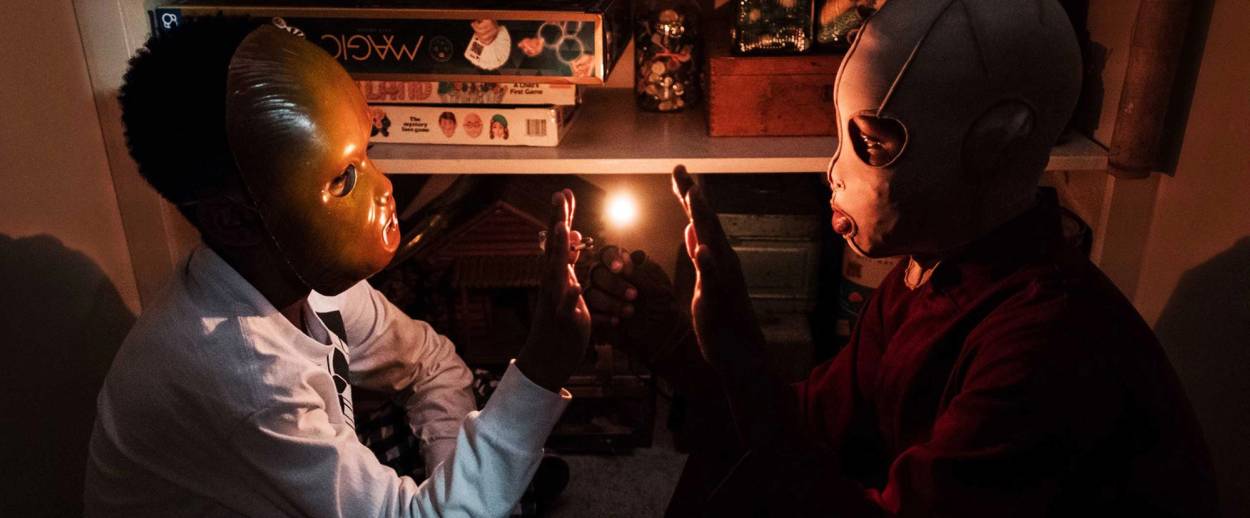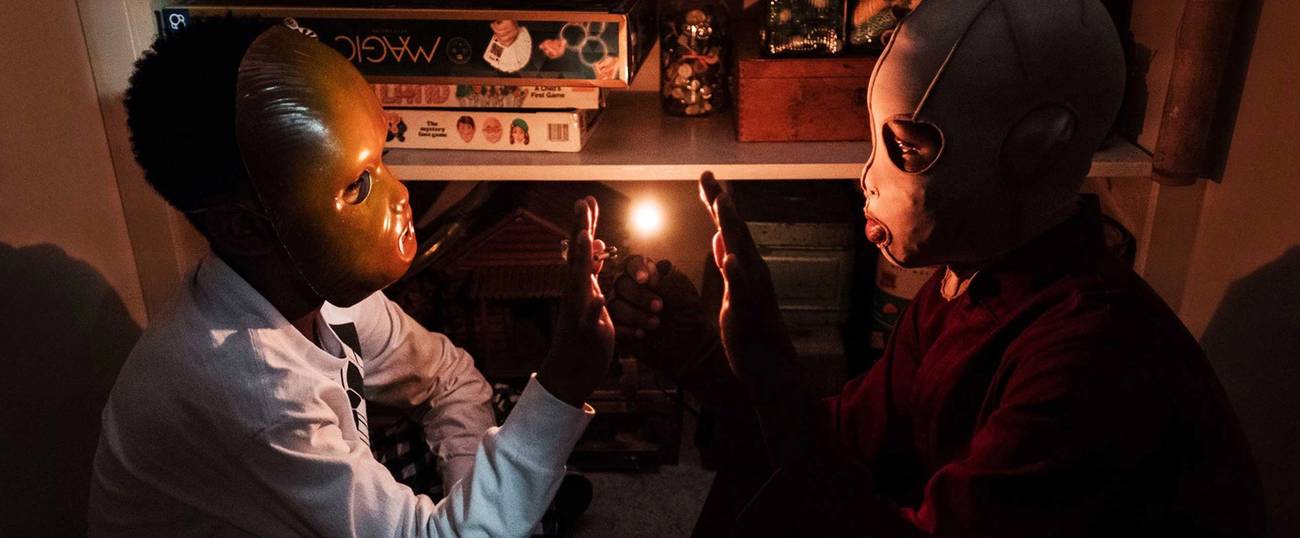Us, Monsters
What Jordan Peele’s visionary new film reveals about the Jussie Smollett affair and the monsters stalking American society in the digital age




How to make sense of l’affaire Jussie Smollett? Three troubling scenarios come to mind.
The first is a good, old-fashioned story of corruption, the kind that made Chicago famous: Think Midnight Run, only instead of a good cop letting a kind crook go free rather than fall into the hands of the city’s grotesquely unjust justice system, cop and crook and system alike are in it together, pulling strings to sweep some embarrassing misdeeds under the rug. It’s a perfectly plausible theory, but not the most interesting one: That distinction belongs to scenario No. 2, less buddy cop drama than Polanski’s Chinatown, a sordid tale of political intrigue in which the huckster in question also happens to be chummy with the former president of the United States—here’s a photo of him visiting the White House, and there he goes dancing on stage with the First Lady—and that it was the First Lady’s former chief of staff who called to intervene on his behalf. Forget it Jake, it’s Chicago.
And then there’s the dystopian horror genre curtain No. 3: a world where what’s been irreparably corrupted isn’t this system or that or one person or another, but reality itself, or, at the very least, our ability to make proper sense of it.
This sort of body politic dysmorphia was the disorder that made Rod Serling famous. Returning home from the war in the Pacific, Serling observed a nation simmering in unreason, besotted with new technologies—the television, the transistor radio—it didn’t fully understand, and quivering with the convulsions brought about by a culture that increasingly insisted that the personal was always and necessarily political. Under such conditions, Serling knew, America was no longer America—it became The Twilight Zone. Traditionally moralistic and always just on the right side of despair, Serling was the Jew standing outside the national tent revival, recording the men and women inside speaking in tongues. You can ask for no better documentation of the folly that had seized America, however briefly, in the 1960s than “The Monsters Are Due on Maple Street,” in which a bright flash of light illuminates a leafy, suburban street on a late summer afternoon. Soon, the amiable neighbors take a shotgun to their tree-lined idyll, convinced that an alien invasion had begun and reduced first to mistrust and then to violence. As the episode ends, Maple Street is a riot scene, and Serling cuts to a nearby hilltop where the real aliens are watching the proceedings, amused that all it took to get Earth to succumb was a small seed of discord.
“The tools of conquest do not necessarily come with bombs and explosions and fallout,” Serling sermonizes in the episode’s closing narration. “There are weapons that are simply thoughts, attitudes, prejudices—to be found only in the minds of men. For the record, prejudices can kill—and suspicion can destroy—and a thoughtless frightened search for a scapegoat has a fallout all of its own—for the children—and the children yet unborn. And the pity of it is—that these things cannot be confined—to The Twilight Zone.”
These things still can’t, which is why CBS, watching so many Maple Streets go up in flames, decided to bring back The Twilight Zone. Serling’s no longer around to helm it, felled by years of smoking and dealing with network executives, and, even if he was, Jews have spent too much of their cultural capital on traveling to the heart of the American mainstream. On the outs now, as brilliant and as angry as Serling ever was, we have the Zone’s new omnipotent narrator, the inimitable Jordan Peele.
What does Peele think of us these days? The best answer is not in his new TV show but in his recently released movie, unimprovably titled Us. The plot—be ready for lots of spoilers—goes something like this: It’s 1986, and a small girl is spending the evening with her parents in Santa Cruz. Dad is momentarily distracted by some boardwalk attraction, and the girl, Adelaide, wanders off into a nearby hall of mirrors. We’ve no idea what she sees there, but whatever it is scares her so badly that she loses her ability to speak. But only, thankfully, for a spell: Soon, it’s present-day, and little Adelaide has matured into Lupita Nyong’o, sitting in the passenger seat of her luxury car and teaching her son, Jason, to snap his fingers to the beat as “I Got 5 on It” plays on the stereo. Her teenage daughter, Zora, is smiling, and her easy-going husband, Gabe, is singing along. It’s summertime, and they’re headed down to their beach house, but the living isn’t easy for Adelaide: Santa Cruz still haunts her, and every minor coincidence reads like a bad omen. She takes refuge in her gorgeous home, waiting for the vacation to end.
But the monsters, of course, are due.
They arrive one night, as monsters do, without warning. Looking out the window, Jason, more curious than alarmed, turns to his mother and says, “there’s a family in the driveway.” Gabe, all good cheer, steps out to investigate, but the strangers—there’s a dad, a mom, a teenage daughter, and a young son—say nothing. They stand there in the shadows, silent, and every American street being Maple Street, it doesn’t take long for the violence to begin. A minute later, the four strangers force their way into the house and into the light. Looking at them, Jason gasps: “They’re us.”
Before too long, we learn that the doppelgängers were created in a secret government experiment—like all masters of the genre, Peele is loose on details—and condemned to live underground, in abandoned subway tunnels, feeding on rabbits and mindlessly mimicking every movement of the free folks upstairs. It’s a premise that invites Freudians, post-colonialists, Marxists, and other assorted grad school types to duke it out over just what it all means, but Peele is too wily to fall into any obvious trap. The Tethered, as the demonic doubles are called, aren’t just scary and symbolic stand-ins for the poor and the disadvantaged, or, at least, not exclusively. When asked who they are, Nyong’o—as Adelaide’s double, Red—delivers the film’s most terrifying line: “We are Americans.”
Just what might these Americans want is made evident by the fact that they’re holding both sharp scissors and a grudge, and soon the lush California backdrop is colored deep crimson. But the Tethered are neither mindless zombies nor, like so many other horror movie beasties, our repressed libidos returning to haunt us. All they want, we learn as the movie draws to its startling end, is to stand together and be seen, joining bloodied hands across America.
It used to be what we above-ground wanted, too, back when Maple Street was still a peaceful enclave. But then, somehow, we got corrupted, and chronicling this corruption is where Peele’s genius is at its sharpest. Take Adelaide’s best friend, Kitty, for example: Played by Elisabeth Moss in a cotton-candy-pink bikini and a cachet of phrases like “it’s vodka o’clock,” Kitty thought she’d be an actress before she got married and pregnant and overwhelmed by the realization that life wasn’t a stream of orgasmic moments. She’s rich and pretty and bored, hard to like but harder to blame: She, after all, was raised on a rich diet of self-affirmation and mass marketing, told she could be whatever she wanted but not that the price for all her fun would be the loss of faith, family, community, and all the other intangibles that made America great in the first place.
And then there’s technology: In one of the film’s many subtly funny moments, a person being attacked shouts out for her voice-operated gadget—a spoof of Amazon’s Alexa, brilliantly renamed Ophelia—to call the police. Instead, the device plays “Fuck the Police” by N.W.A, underscoring the scene with both the perfect soundtrack and the ironic glow of a culture made limp by its media.
Terrible values and great gizmos is a lethal combination, as Serling himself made a career demonstrating. But whereas the disastrous devices that haunted the Old Master’s imagination were either imaginary, like a stopwatch that can freeze time, or took sizable GDPs to produce, like a nuclear bombs, the soul-warping technologies Peele observes are the ones we each carry around in our pockets. Each normal person, we learn early on in the movie, shares a soul with her or his Tethered other; but when our conversation is reduced to texting in emojis, when our information is distilled to a torrent of tarnation on social media, when love and shoes and groceries are all ours for the taking simply by swiping the screen of our smartphones, we’re using so little of our soul that our subterranean others might as well take it all. And indeed, the Tethered are the only ones in the movie who are even marginally recognizable as human: They rage, revel, howl, and grieve, while all the while their pampered victims look on in bafflement, because, we realize, nothing about their real lives had ever prepared them for real life.
Nothing prepared us, too, and nothing prepared Jussie Smollett either. What, after all, is real to a generation whose joys and fears and frustrations flicker off and on in short and coded bursts of digital ejaculations? And if racists wearing MAGA hats and contemplating lynching are all too real on Twitter and Teen Vogue and all the other electronic watering holes where the young come to lap at meaning, isn’t hiring two buff Nigerians to playact this scenario in the physical world merely a creative act? In an era where young men copulate at historically low rates and watch porn more than ever before, it’s hard to fault Smollett his anxiety of the real. If he were a character in Us, his comeuppance would arrive in the form of an underground Jussie doppelgänger clutching shears and seeking a reckoning. But he’s a person in Chicago, and so it ends not with a pair of shears but a press conference.
There’s no comfort in that. The anticlimactic ending of Smollett’s story makes it all the more terrifying. The monsters, we know, are still due, as they always are when society’s fabric is frayed. And when they come, we know, we’ll be helpless. The path forward is only traversable if we attempt it together, not by pretending we’re each the star of his or her own little drama but by holding hands and standing perfectly still and covering the entire land.
***
Like this article? Sign up for our Daily Digest to get Tablet magazine’s new content in your inbox each morning.
Liel Leibovitz is editor-at-large for Tablet Magazine and a host of its weekly culture podcast Unorthodox and daily Talmud podcast Take One. He is the editor of Zionism: The Tablet Guide.